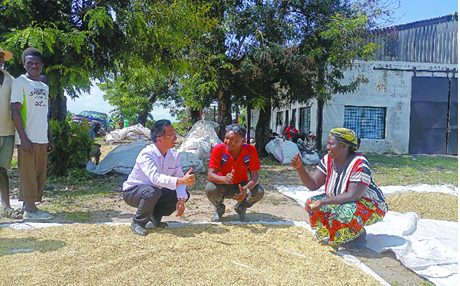Grabbing his phone and packing his backpack, Sonam Tsering, a forest ranger from a village, Bayi district, Nyingchi, southwest China’s Xizang autonomous region, started another patrol in the woods.
The village, located in the northwest of Bayi district, is surrounded by thick primitive forest. As Sonam Tsering trekked further down a small path in the forest, he occasionally took photos of the surrounding trees and made notes, promptly uploading the issues he discovered to a system through a mobile application that was specifically developed by Nyingchi for forest rangers.
With this application, forest rangers can record problems found in patrols and track their routes, so as to ensure the patrols are science-based and efficient.
And all of this was made possible with the support of a stable network. “Since our village accessed the 5G network, we could use more equipment and facilities, which are playing an increasingly important role,” Sonam Tsering told People’s Daily.
Kelsang Tseten, head of the village, has witnessed the village’s network upgrading. According to him, the villagers could not open even a simple web page before, but now they can watch online videos smoothly.
Many travelers were more than surprised. Kelsang Tseten often sees tourists livestreaming at the entrance road of the village. Many tourists pass through the village because it is near a renowned forest park, and the 5G network covering the village makes it easier for them to share their experiences.
“In fact, this has made our village more visible. When tourists post content on social media marked with our village location, many others follow the location and make this place their destination. Tourists can take a break in the village, have some snacks, and shop in local convenience stores, which contribute to the development of the village,” Kelsang Tseten said.
The developed network has allowed the world to learn more about Nyingchi. Every March and April, the Nyingchi peach blossom festival opens in various places in the city, attracting a large number of tourists. Thanks to the fast 5G network, the beautiful peach blossoms can be shown to viewers all over the world through livestreaming.
Photo shows a 5G base station built by China Mobile in Pumaqangtang township, China’s highest township, in southwest China’s Xizang autonomous region. (Photo from the Xizang branch of China Mobile)
In addition, the harvests of the Nyingchi are also able to find new markets through the 5G network. For instance, apples and grapes in Mainling county, Zayu county’s kiwi fruits, and Medog county’s artisanal stone pots and teas are all sold through livestream marketing today.
The 5G network has brought new ideas for industrial development. In order to better integrate information technology with traditional agriculture, an ecological agriculture and animal husbandry company called Yarlung in Xizang’s Shannan has implemented a smart greenhouse project using 5G and Internet of Things technologies.
This has achieved production automation and intelligent management, saving 6.5 million yuan ($722,300) in labor costs for the company each year. The project has increased corn yields by 15 percent and tomato yields by 29 percent, and reduced maintenance costs by 50 percent compared to the original level.
The Julong Copper Mine, located in Lhasa, has an average altitude of over 4,000 meters with harsh operating conditions. Thanks to a 5G-enabled unmanned driving project for open-pit mining, the mine has been developed with reducing labor input and improving working environment. This project sets a benchmark for the upgrading and transformation of the industrial internet sector in Xizang.
According to Xizang’s communications administration, the autonomous region has built over 8,700 5G base stations so far, covering all the counties and main townships with the 5G network and providing 5G services to 1.84 million users. There are 23 5G base stations per 10,000 people in the region, reaching the national average.












